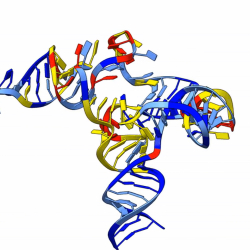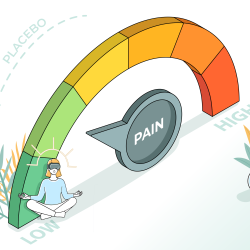The Road to Drug Discovery
From big pharma to small startups, Peng Yue’s (Ph.D. ’05, molecular and cellular biology) 20-year, disease-fighting career set the stage for his current role as co-founder and CEO of biotech startup ReviR Therapeutics.

From big pharma companies to small biotech startups, Peng Yue (Ph.D. ’05, molecular and cellular biology) has spent 20 years developing new ways to fight human disease. Throughout his career, Yue’s expertise in computational biology and bioinformatics put him on the front lines of drug discovery. Today, as co-founder and CEO of ReviR Therapeutics, Yue leads the startup’s mission to leverage the power of machine learning and advanced RNA technologies to improve human health.
“Sometimes I feel like running a company is a lot like running an academic lab,” Yue explained. “You get into a space, you're inspired by an idea, a hypothesis that you want to explore, and the data will tell you when you’re on the right track—also, when you’re wrong. You’re always discovering something new, and I definitely enjoy that.”
From the beginning, ReviR focused on developing small-molecule drugs that target and modify RNA, the molecule in living cells that carries genetic information and plays a key role in protein synthesis, to treat cancer and genetic neurological disorders like Huntington’s disease. Now, four years in, Yue sees ReviR making significant progress toward that goal.
“We believe now is the time to develop a technology that will enable us to modulate RNA function,” he said. “After four years of research, we actually have several programs in our pipeline to target specific, rare neurodegenerative diseases. Our first program probably will move into clinical trials sometime later this year.”
A new perspective
Yue grew up in China, earning his undergraduate and master’s degrees in biochemistry at Nankai University in Tianjin. In 1999, he left home and family behind to begin his Ph.D. at the University of Maryland, where his focus shifted toward computational biology. Inspired by the discoveries of the Human Genome Project—a huge international effort to map and sequence the human genome for the first time—Yue began exploring the problem-solving power of computational biology and bioinformatics in Professor John Moult’s lab.
“In my Maryland experience—especially in John Moult’s lab--I really got the opportunity to explore biology from a new perspective,” Yue recalled. “It was the perfect time because the sequencing technology of human genomic research was changing the way biology was being studied. Moult, a pioneer in the field, had co-founded the CASP competition in 1994 to bring rigor to protein structure prediction. That foundational work helped drive advances that eventually led to breakthroughs like Alpha Fold, which now predicts most human protein structures—a major boost for biomedical research. Back then we didn’t have Alpha Fold, but there were signs that some structures could be modeled computationally. Being in John’s lab meant I could explore this computational angle and really begin to open up new tools to understand biology.”
Gene Logic, Genentech and Gilead
By the time Yue started working on his dissertation, demonstrating how protein structure modeling could be used to evaluate the mutation of disease, he was also a full-time bioinformatics scientist at Gene Logic, an integrated genomics company. It was a unique research opportunity he couldn’t pass up.
“Gene Logic was one of the very early genomic-based companies. They were trying to use the microarray, which was really new technology at the time, to do predictive modeling for safety, so you could predict the toxicity of a given drug much earlier,” Yue recalled. “I joined the company and ended up working there while I finished my dissertation.”
Yue earned his Ph.D. in 2005 and moved to California a year later to join Genentech as a computational biologist to work on the threshold of drug discovery.
“Like some other companies, Genentech was interested in sequencing tumor samples to understand the mutations that drive tumor growth,” Yue explained. “I was able to explore how we can computationally try to understand, with the many mutations you can identify from the tumor sample biopsy, which ones you can prioritize. This gave me opportunities to see how drug discovery was being done in the traditional setting.”
From Genentech, Yue went on to lead bioinformatics at Gilead Sciences, expanding the company’s research in immunotherapies for HIV, hepatitis B, cancer and other diseases.
“Gilead was transitioning from an antivirus company to working on a lot of diseases, and I helped them build up their computational biology research,” Yue said. “My group ended up working in every kind of disease therapeutics, not just antivirus, but also oncology, liver disease and even cardiovascular disease.”
Another journey—on the road
As Yue’s journey in drug discovery continued, another very different journey began, this one on the road.
Seven, maybe 10 years ago, I started running,” he said. “As time went on, I took on personal challenges, including finishing a few marathons and setting my own personal goals for how fast I was going to run.”
For Yue, running and research kept him focused, energized and motivated. And the challenges along the way provided inspiration for the road ahead.
“Like research, I feel like running is really interesting. It allows you to solve problems and explore a lot of different things. After a run, there are new ideas in your head that weren’t there before you left,” Yue noted. “My work makes it harder to find the time to run, but I still keep running whenever I can.”
From cancer to RNA
In 2017, Yue joined Stemcentrx, a startup that had just been acquired by AbbVie, leading computational efforts to identify cancer stem cell targets for antibody drug conjugate discoveries. For Yue, the experience was inspiring.
“Working there was almost like being in a startup within AbbVie, and I really appreciated that approach—sometimes you have to be brave and take chances,” Yue explained. “During that time, I started to think that's how you start a company—maybe I want to create something like that myself someday.”
Yue’s career path took him to consumer genetic testing company 23andMe first, where he joined a research and development initiative using human genetic data to develop new therapies for common and rare diseases.
“My role there was to work with really big genetic data,” Yue recalled. “We were tapping into data from about 12 million people to explore a new target: how do we leverage that for research to potentially have an impact on human health?”
In 2021, with more than 15 years of experience, Yue co-founded ReviR Therapeutics. By that time, the global COVID-19 pandemic sparked renewed interest in RNA-based drug discovery, and ReviR hit the ground running. Now, as the company continues to grow and its advanced RNA-based technologies move toward their first clinical trials, Yue is inspired by the possibilities.
“I feel like we have a shot here. Using small molecules to target RNA is real; we can identify a target or compound to treat different diseases, and that’s exciting,” he said. “I know it’s early, and the science is really hard, but even if one drug didn’t work, we feel like there's always another opportunity. We'll keep exploring as long as it takes.”







